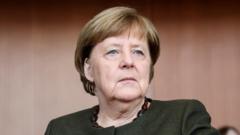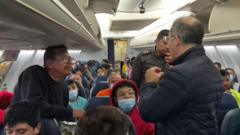The recent attack in Magdeburg, where five lives were lost and over two hundred injured, has left the community reeling. As the recovery process begins, the event's implications threaten to amplify divisive narratives around immigration and far-right politics.
Tragedy in Magdeburg: A Christmas Market's Dark Turn

Tragedy in Magdeburg: A Christmas Market's Dark Turn
A tragic incident at a Christmas market in Magdeburg raises fears of political exploitation and societal division.
The attack occurred during the festive season, prompting emotional responses from survivors and family members. One grieving local, Eidwicht, expressed her anguish as she waited for news of her granddaughter, who was present during the chaos. “I feel bad, I still do,” she shared, highlighting the pervasive sense of sorrow and rage directed towards the government and migrant communities.
Authorities apprehended a 50-year-old Saudi refugee, Taleb Al-Abdulmohsen, as the primary suspect but have not disclosed the motive behind the attack. Characterized as an "untypical" assailant, Al-Abdulmohsen had publicly criticized Islam and shown support for the far-right Alternative for Germany (AfD) party—an association that has not gone unnoticed. With the upcoming federal elections looming, this incident has provided fertile ground for the AfD to amplify its messages concerning security and immigration.
Party leader Alice Weidel is set to participate in a funeral procession for the victims and, subsequent to the attack, remarked on social media that "Magdeburg would not have been possible without uncontrolled immigration." These statements reflect a party narrative that taps into public fears about security.
Counterdemonstrations are emerging in response, with anti-racism groups accusing the AfD of exploiting the tragedy for political gain. Local activist David Begrich voiced concerns about the potential scapegoating of migrant communities amidst the upheaval, calling for unity rather than division.
Questions linger, however, about how such an act of violence was able to occur despite prior assessments that deemed the threat posed by Al-Abdulmohsen as “too unspecific.” Criticism has also been directed at security protocols that left a gap for emergency access, which the suspect exploited.
As the Christmas market begins to reopen, vendors are allowed to reclaim their spaces, yet the atmosphere remains somber. Journalists covering the aftermath have reported hostility from some locals, amid fears of far-right elements hijacking the narrative. A vigil in honor of the victims served as a moment of solidarity, although the division within the community remains palpable.
The attack in Magdeburg is more than a local tragedy; it has become a flashpoint in the larger discourse surrounding security and immigration in Germany, setting the stage for potential political ramifications in the upcoming elections.
Authorities apprehended a 50-year-old Saudi refugee, Taleb Al-Abdulmohsen, as the primary suspect but have not disclosed the motive behind the attack. Characterized as an "untypical" assailant, Al-Abdulmohsen had publicly criticized Islam and shown support for the far-right Alternative for Germany (AfD) party—an association that has not gone unnoticed. With the upcoming federal elections looming, this incident has provided fertile ground for the AfD to amplify its messages concerning security and immigration.
Party leader Alice Weidel is set to participate in a funeral procession for the victims and, subsequent to the attack, remarked on social media that "Magdeburg would not have been possible without uncontrolled immigration." These statements reflect a party narrative that taps into public fears about security.
Counterdemonstrations are emerging in response, with anti-racism groups accusing the AfD of exploiting the tragedy for political gain. Local activist David Begrich voiced concerns about the potential scapegoating of migrant communities amidst the upheaval, calling for unity rather than division.
Questions linger, however, about how such an act of violence was able to occur despite prior assessments that deemed the threat posed by Al-Abdulmohsen as “too unspecific.” Criticism has also been directed at security protocols that left a gap for emergency access, which the suspect exploited.
As the Christmas market begins to reopen, vendors are allowed to reclaim their spaces, yet the atmosphere remains somber. Journalists covering the aftermath have reported hostility from some locals, amid fears of far-right elements hijacking the narrative. A vigil in honor of the victims served as a moment of solidarity, although the division within the community remains palpable.
The attack in Magdeburg is more than a local tragedy; it has become a flashpoint in the larger discourse surrounding security and immigration in Germany, setting the stage for potential political ramifications in the upcoming elections.





















